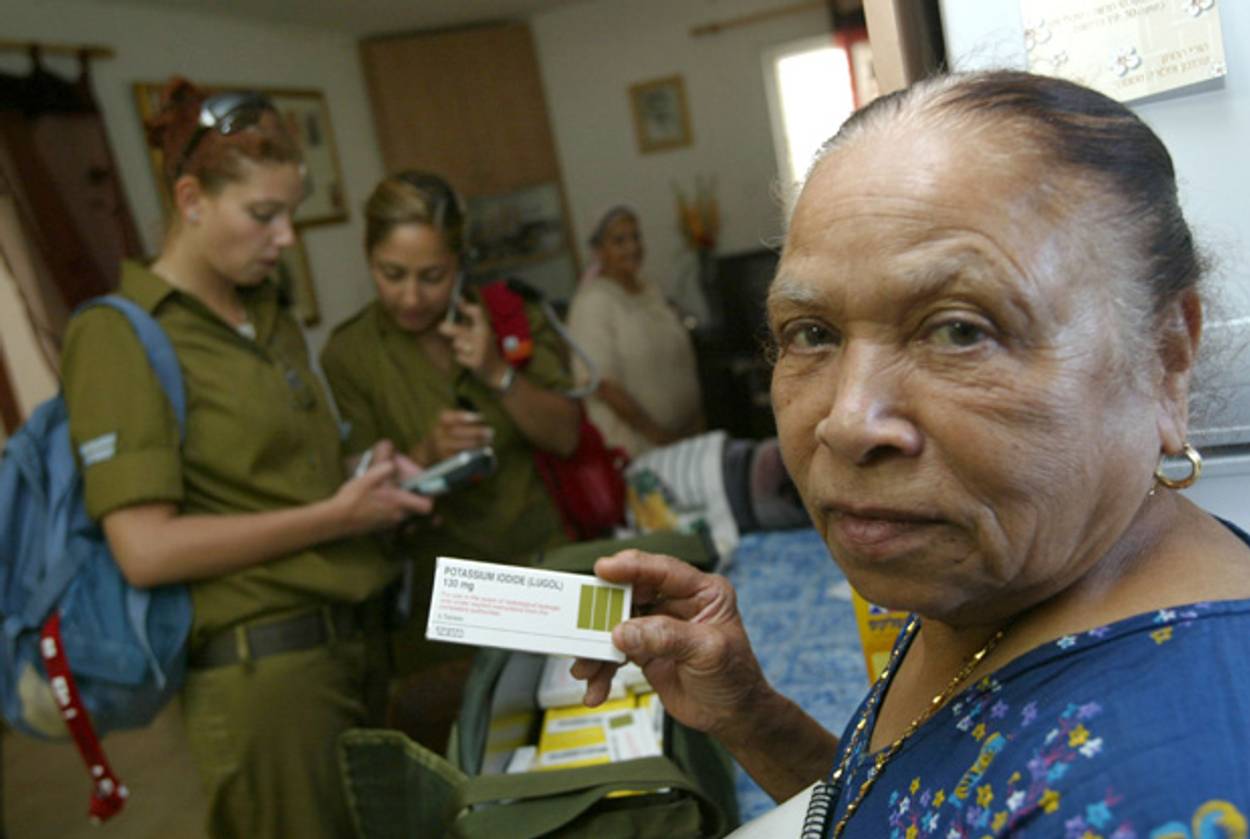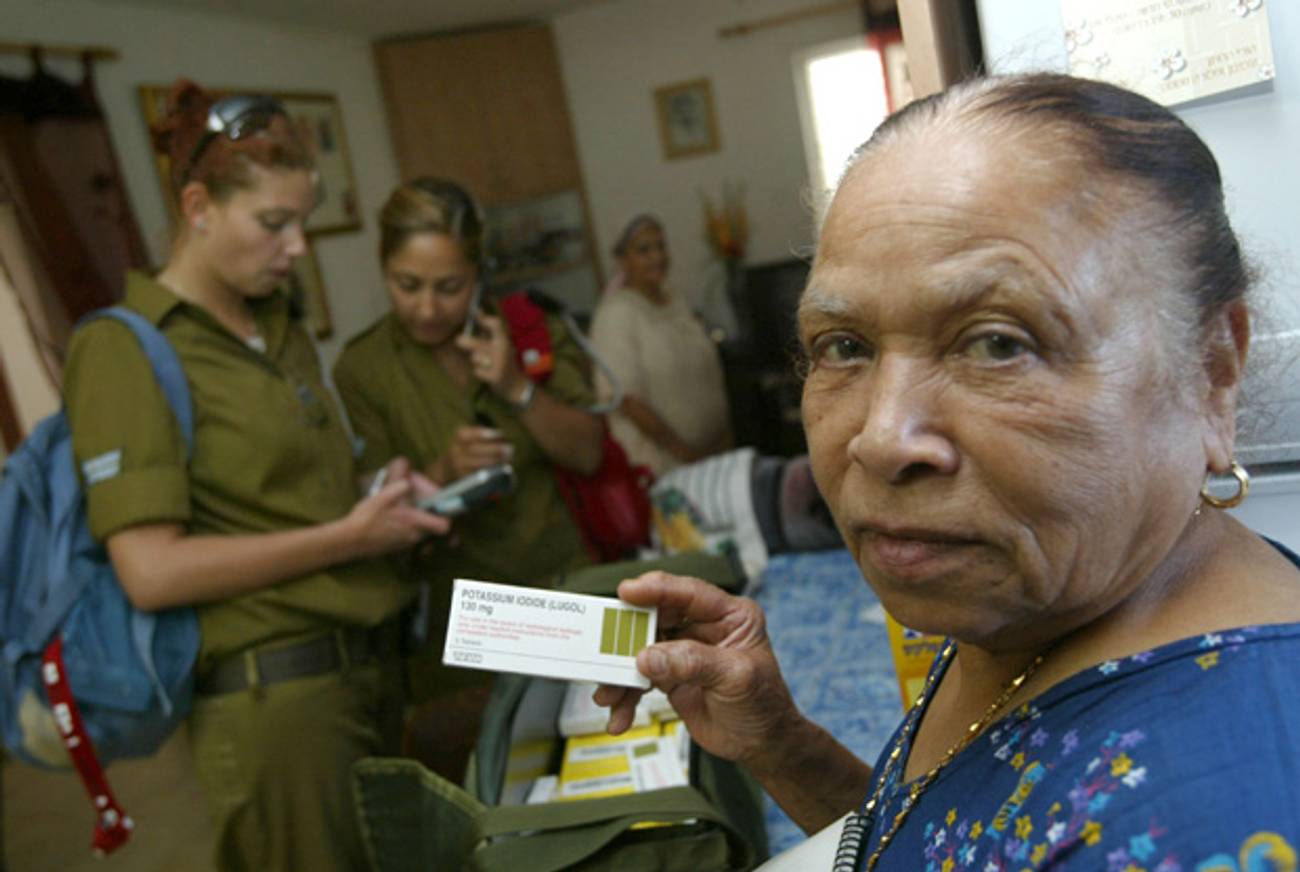In the Reactor’s Shadow
If Israel decides to carry out a strike against Iran, the desert town of Dimona could be a likely target for retaliation. Are its residents worried?




Tuesday night in Washington, D.C., Israeli Prime Minister Benjamin Netanyahu was met with one standing ovation after another at AIPAC’s Policy Conference as he reiterated that he would never let Israelis “live under the shadow of annihilation.” But how do the Israelis who would be most affected by a strike against Iran’s nuclear program—the ones who literally live in the shadow of Israel’s own nuclear reactor—feel about the prospect of war with the Islamic Republic?
Ahead of the AIPAC conference, I went down to Dimona, population 35,000. If Israel attacks Iran’s nuclear facilities, this Negev city is one of the places that immediately comes to mind as a target for Iranian retaliation.
Dimona has a strongly nationalistic profile: Control of the municipal government passed from Likud to the far-right Yisrael Beitenu in 2003, the city’s residents are mainly low-income Sephardim and Russian immigrants, and there’s a strong Orthodox and ultra-Orthodox presence. Given all this, I expected virtually everyone I interviewed to favor an attack or have no opinion.
I was wrong. Of the 23 people I spoke to, 13 were in favor of a strike, seven opposed it, and three were undecided. Of the 13 in favor, seven were young army recruits.
What I found seems reflective of nationwide sentiment among Israelis. On March 1, a survey by University of Maryland Prof. Shibley Telhami and the Dahaf Institute, Israel’s leading public-opinion polling firm, found that only 19 percent of Israelis supported Israel going it alone in a strike on Iran. A plurality—42 percent—favored a joint American-Israeli attack, while 34 percent were against the military option altogether.
The public debate in Israel over what to do about Iran has been completely dominated by Netanyahu, Defense Minister Ehud Barak, and commentators who echo their line. Yet there are Israelis—in addition to former Mossad chief Meir Dagan—who dissent from the official government position. It’s highly unlikely that Netanyahu spoke for them in his meeting earlier this week with President Obama, but I heard them in Dimona.
***
My first stop in Dimona was Nahalat Ephraim yeshiva, where I was welcomed by the headmaster, Yossi Peretz. Peretz, it turned out, was also a Dimona city councilman representing Shas, the right-wing ultra-Orthodox party. Several teenage boys, all dressed in white shirts and black pants, followed Peretz and me into a neat little room with a kitchenette, prayer books, and a photo of the Baba Sali, the late Moroccan kabbalist beloved by the country’s devout Sephardim.
“In my opinion, we should not attack,” said the 34-year-old Peretz as we sat across from each other. “Diplomacy is best, war is the worst. We have to try all possible ways of pressuring Iran, but until there is a real, close threat that they will use nuclear weapons against us, we shouldn’t attack. Nobody here wants war, nobody has the strength for it.” He didn’t think Israel was going to start one, either, because “we don’t have the support of other countries.”
What’s it like living in the shadow of the Negev Nuclear Research Center? “In one way it’s good, because you feel protected with all the defenses they’ve got around it. On the other hand, if something happens with Iran, you know this place is going to be the first target.”
Dimona was built in the early 1950s to house North African immigrants, and in the ’90s it grew substantially with the influx of Russians and Ethiopian immigrants. With the exception of its fancy northern neighborhoods, the town doesn’t look like it got past the ’70s. Framed by light-brown hills, Dimona is dominated by shabby beige stucco tenement blocks covered with graffiti and laundry hanging out of the windows, little cut-rate shops, snack bars, sand lots, palm trees, and painted sculptures, such as the one in a traffic circle—of Herzl.
Construction on the reactor, which can be seen at a long distance after you drive miles out of town, began in 1958, and it reportedly produced its first nuclear bomb within a decade. Israel is said to have chosen the site because it was commuting distance from Beersheba, where the French scientists who led its construction were housed, and because it is not right on top of large concentrations of people. (In those days, Dimona had a few thousand people, with many Bedouin settlements nearby.) While the Negev Nuclear Research Center provides many jobs to the town’s residents, it is also being sued by dozens of former employees who blame their cancer conditions on radiation inside the plant.
Mayor Meir Cohen was out of town the day I visited, but we spoke by phone. The party he is aligned with, Yisrael Beitenu, which is headed by Foreign Minister Avigdor Lieberman, is overwhelmingly Russian, yet Cohen, 56, is Moroccan-born. He moved here with his family and the other town founders 50 years ago.
Regarding Iran, Cohen told me that while sanctions should be given some more time to persuade Iran to give up its nuclear program, he didn’t expect them to work. “If we see that sanctions are not stopping Iran, we have to protect our children’s future and our country’s future.”
“We must remember what Chamberlain said after he met Hitler: ‘I have achieved peace in our time.’ A few months later, there was war,” he said. The Iranians, said Cohen, cannot be deterred because they are driven by “a crazy ideology, just like Hitler.” Rulers who turn their guns on their own countrymen protesting in the streets, he argued, will use nuclear weapons against their enemies.
Was he concerned about his town catching the blowback from a possible Israeli attack? “I think that today, all of Israel is one big target,” he said.
During the day, I talked to seven young army recruits, and all were in favor of hitting Iran. There was a clear difference in attitude, though, between the four soon-to-be-soldiers studying at a hesder (pre-army) yeshiva, and the three off-duty soldiers who were on their way to play tennis in the town’s upper-middle-class neighborhood.
On a break in the backyard of the yeshiva, the boys, 18 and 19, brought up the Torah verse that implores: “When someone comes to kill you, kill him first.” But they didn’t sound gung-ho and didn’t try to hide their uncertainty about the actual matter of war. “Whatever the leaders of the army decide, they’re the ones who know,” was their common response.
Three off-duty soldiers going to play tennis, however, sounded like young warriors. “We have to hit them, that’s what all the soldiers say, we have to take them down,” said Ariel Bismuth, 22. “We’re not afraid. Long live death, you know? Ha ha,” said Yoel Bar Natan, 21. “The Iranians won’t get to Dimona, the army won’t let them,” said Eden Rosalio, 21.
Walking past a park in the stylish neighborhood, Dov Elbaz, 23, said the presence of the reactor “makes us feel protected.” About whether Israel should bomb Iran, he said, “I don’t know. If we have to, yes, but I really don’t know.” His girlfriend, Roni, 17, added: “I don’t ever think about it.”
***
Dimona is a town where older people sit on benches and kibitz, and in City Hall square, amid a jumble of shops and cafes, I met three Sephardi pensioners, each around 70, doing just that. I asked what they thought about the possibility that Israel would attack Iran.
“It’ll be the end of the world. Iran, Syria, Hezbollah, Hamas, everybody will be against us,” said Meir Turgeman, the only one who would give his full name.
“There will be 50,000 missiles falling on us; the Iron Dome [Israel’s missile defense system] can’t stop them all,” said his friend.
“What will it get us? There will be missiles falling all day, and Dimona will get the worst of it. I’m not worried for myself, it’s the children I’m worried for,” said a third man. “They’re going to go crazy with fear.”
Larry Derfner blogs at +972 Magazine and contributes to Salon, The Nation, and various American Jewish publications. Born in New York and raised in Los Angeles, he moved to Israel in 1985.
Larry Derfner blogs at +972 Magazine and contributes to Salon, The Nation, and various American Jewish publications. Born in New York and raised in Los Angeles, he moved to Israel in 1985.